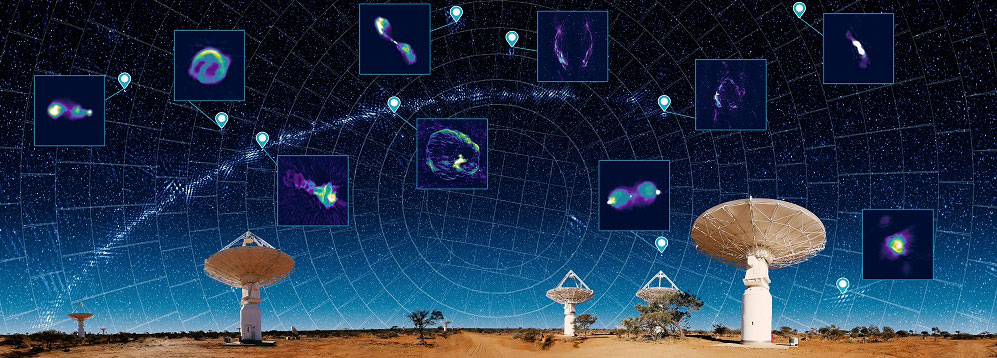Our telescopes generate huge amounts of data. In the Australia Telescope National Facility (ATNF), we find ways to collect, maintain and share this data with the rest of the world.
Astronomical data archives that currently provide over 12PB of data, as well as various catalogues, databases and software packages used for obtaining and processing data from our facilities. These data archives are increasing at approximately 4PB/year, and is likely to double in a few years.
We have three archives for our data:
- Our high-time-resolution datasets from Murriyang, our CSIRO Parkes radio telescope are archived in the CSIRO Data Access Portal (DAP). It was in this data where the first fast radio bursts were discovered, it includes the Pulsar Catalogue (PSRCAT) – the largest database of pulsars available – and so much more.
- Science ready data products from observations by our ASKAP radio telescope and automatically processed by our pipelines are made available in the science data archive, CASDA.
- Spectral line and continuum observations from Murriyang as well as data from our Australia Telescope Compact Array and the Long Baseline Array are archived in the Australia Telescope Online Archive (ATOA). These are currently being migrated into CASDA.
Some data we collect for specific surveys. Our ASKAP radio telescope has produced the Rapid ASKAP Continuum Surveys (RACS), which are the most detailed of their kind in the world. Containing a catalogue of over 2 million objects, RACS has imaged the Southern Sky in multiple frequency bands. The first RACS broke records for speed and detail. Over the years, we've also produced many other surveys with our instruments, such as the galactic neutral hydrogen survey, HIPASS.
Visit our ATNF Data Archives for your research.

Our telescopes generate huge amounts of data. In the Australia Telescope National Facility (ATNF), we find ways to collect, maintain and share this data with the rest of the world.
Astronomical data archives that currently provide over 12PB of data, as well as various catalogues, databases and software packages used for obtaining and processing data from our facilities. These data archives are increasing at approximately 4PB/year, and is likely to double in a few years.
We have three archives for our data:
- Our high-time-resolution datasets from Murriyang, our CSIRO Parkes radio telescope are archived in the CSIRO Data Access Portal (DAP). It was in this data where the first fast radio bursts were discovered, it includes the Pulsar Catalogue (PSRCAT) – the largest database of pulsars available – and so much more.
- Science ready data products from observations by our ASKAP radio telescope and automatically processed by our pipelines are made available in the science data archive, CASDA.
- Spectral line and continuum observations from Murriyang as well as data from our Australia Telescope Compact Array and the Long Baseline Array are archived in the Australia Telescope Online Archive (ATOA). These are currently being migrated into CASDA.
Some data we collect for specific surveys. Our ASKAP radio telescope has produced the Rapid ASKAP Continuum Surveys (RACS), which are the most detailed of their kind in the world. Containing a catalogue of over 2 million objects, RACS has imaged the Southern Sky in multiple frequency bands. The first RACS broke records for speed and detail. Over the years, we've also produced many other surveys with our instruments, such as the galactic neutral hydrogen survey, HIPASS.
Visit our ATNF Data Archives for your research.
Our Australia Telescope National Facility
Explore our radio astronomy telescopes and discover why they are world-leading.
